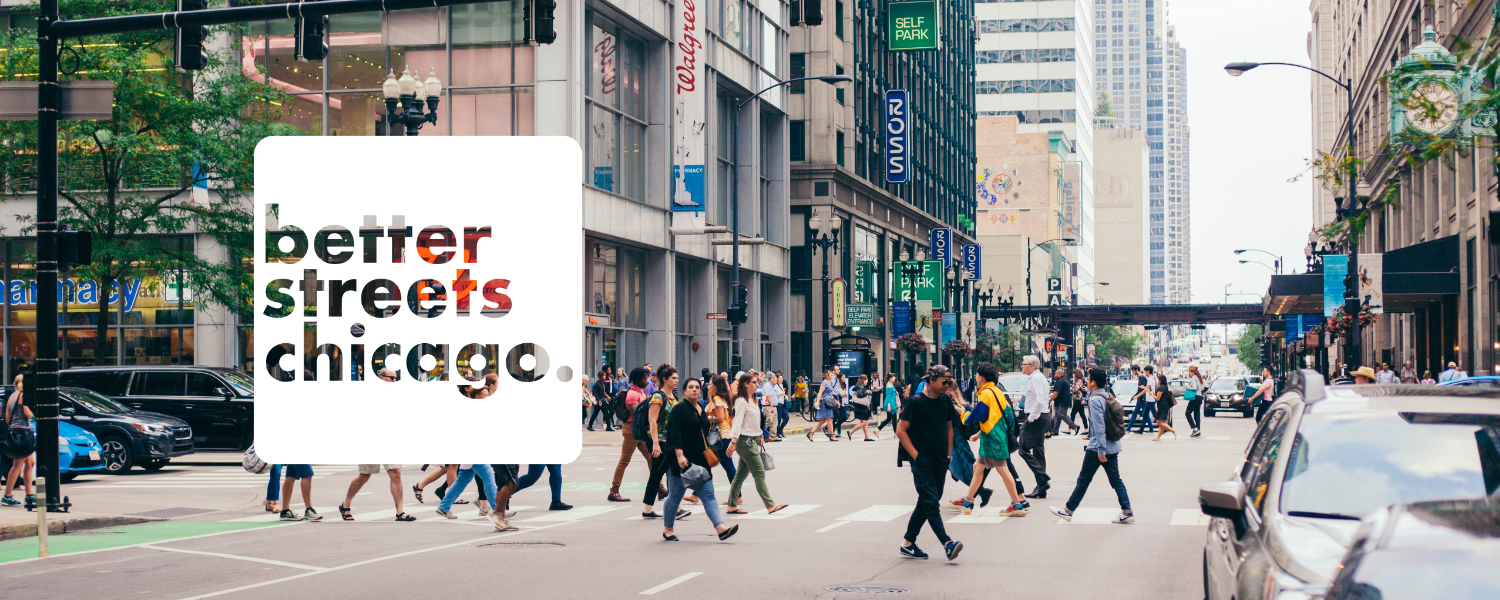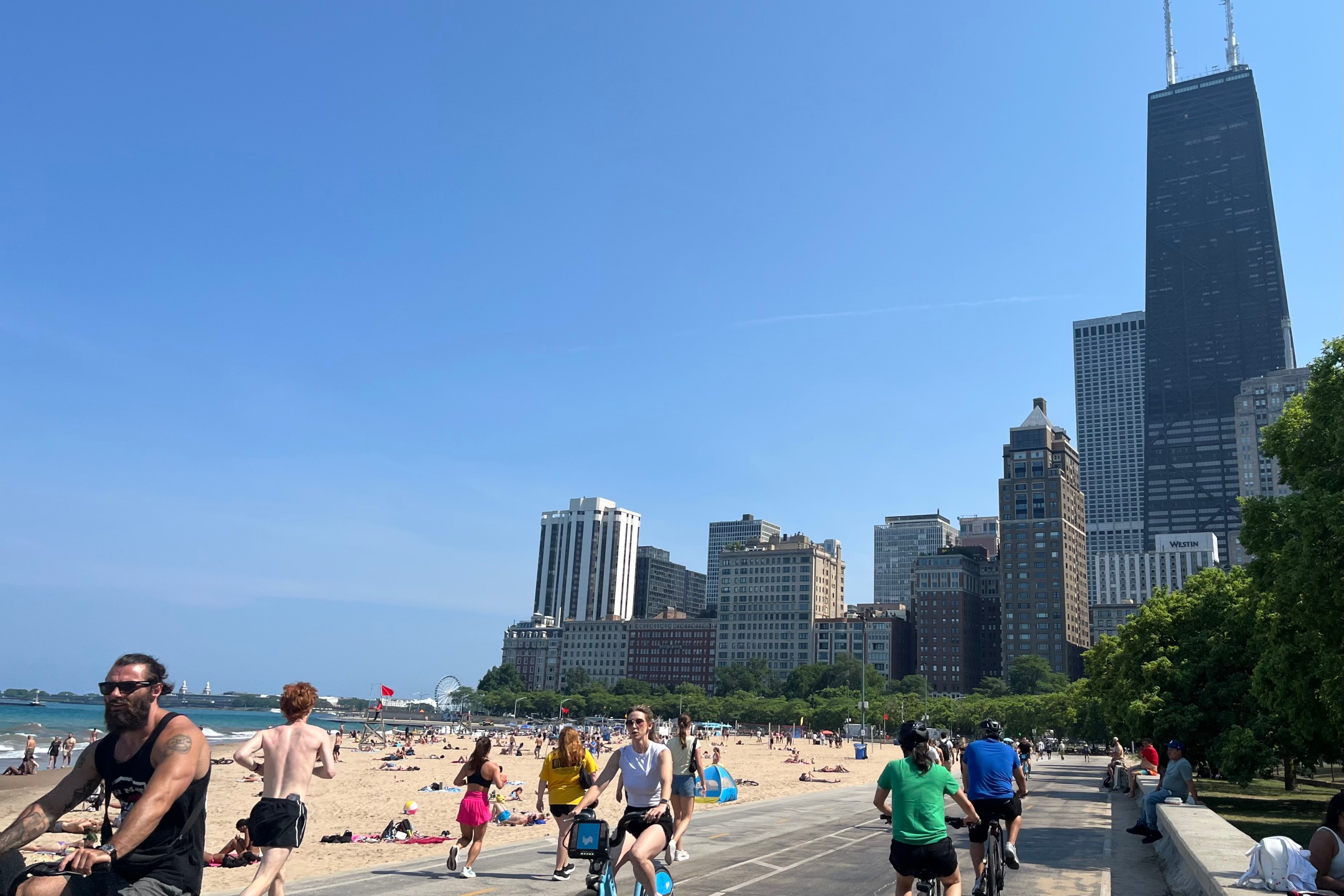Better Streets Chicago is a new organization with a stated goal "to make Chicago more livable, equitable and safe." It was founded by Kyle Lucas, an architecture student who works essential jobs at a hotel and a delivery market; along with Brittney Lane, a marketing manager at a healthcare-related non-profit; Jim Hodapp, an engineering manager for a local government technology company and host of the Livable City Podcast; and Streetsblog Chicago assistant editor Courtney Cobbs.
Lucas, who is HIV-positive and can't ride transit during the pandemic, responded to Mayor Lori Lightfoot's March 26 closure of the Chicago shoreline, the Chicago Riverwalk, and The 606 with a petition to reopen trails and/or open streets for walking and biking, something that just about every major blue-state city except ours is currently doing. The petition currently has about 1,400 signatures.
Better Streets Chicago was created to take the campaign to the next level. "We’ve been disappointed by Mayor Lightfoot and [transportation commissioner Gia] Biagi’s failure to take seriously the needs of Chicagoans to be able to be outside, to be able to walk and bike and roll to the bus and work and store and park — wherever they need to go — while maintaining a safe distance from each other and from cars," Lucas said in an email. "By creating open streets, Chicago can allow for pedestrians, bike riders and even transit users to get outside, run errands or just get some exercise while practicing social distancing and reducing the likelihood of a collision with an automobile."
They've launched a letter-writing campaign to urge Lightfoot and the Chicago Department of Transportation to implement an open streets program. Within a few days, more than 100 letters have been sent. Better Streets Chicago also plans to advocate for strategies to speed up CTA buses.
I caught up with Lucas to get more info about the new group. The interview has been edited for clarity and length.

Imelda March: In layperson's terms, what is Better Streets Chicago?
Kyle Lucas: Better Streets Chicago was founded in January 2020 by myself, Courtney Cobbs, Jim Hodapp, and Brittney Lane. We founded this organization because we wanted a more agile way to empower people to take action in their immediate communities. Our organization is looking for safety for people on bikes, pedestrians, and addressing slow bus service issues.
IM: How are you different than the Active Transportation Alliance?
KL: ATA is a great organization that does excellent work; however, they are more focused around policy and giving more specific recommendations to street design. It is also an organization that is broad, and we want to focus on city issues. The community could shape what the organization would look like in the future. In summary, we want to mobilize people to take action in their community by creating civil disruption and empower community members talk to their aldermen to solve issues in the city.
IM: You have collected roughly 1,400 signature asking for the re-opening of the Lakefront Trail and possible implementation of open streets? Who are these supporters?
KL: The petition came about from my experience with commuting by bike to get to work. With the Lakefront Trail closed, I discovered that there were fewer ways for me to get to work safely. One of the reasons I had moved to the North Side was to have easy access to the path to get to work. For me, the issue heightened when there were no alternatives provided [by the city] with its closure. The problem did not only lay on this closure, but the lack of available safe ways to get downtown got me thinking a bit more.
Further, there were other cities such as Bogotá, Oakland, Mexico City, and New York. These cities created quick-build walkways and bike lanes for their citizens. Recently, Anne Hidalgo, the mayor of Paris, announced the rollout of 400 miles of protected bike lanes for their constituents to get around. More specifically, in Oakland they created a Slow Streets network not only for recreation but for transportation. Seeing these efforts, I wished that the Chicago Department of Transportation and the Chicago Department of Planning and Development did the same for Chicago.
[From the Lakefront Trail / open streets petition], I started to see feedback from medical facility workers who relied on [the Lakefront Trail] to get to work.
IM: How are you unifying different communities for a discussion? Who will have a seat at the table to discuss creating safer routes?
KL: In our letter to the city, we want them to consider our ideas in the realm of possibilities and to work with community groups to find out what each specific community needs. There are no one-solution fits all approach, but we cannot continue to slap paint on the streets and call it a safe bike lane.
I do not know who needs to have a seat at the table. We want to ensure that there's outreach to community members that are closer to the community issues and are ready to provide solutions that address the needs of the various communities. We are trying to promote the COVID mobility email [covidmobility@cityofchicago.org] that the city has set up to collect input on pandemic-related mobility issues in the city.
Me being a white guy from the North Side, I have a [particular] perspective. So we want to promote the email, so people [from different walks of life] have an outlet to provide ideas for creating safe ways to get around.
IM: How will you make sure that an open streets or Slow Streets plan meets the needs of people from marginalized communities, such as people of color? For example, do you have any data that shows that people from POC communities would use Slow Streets routes for bike commuting?
KL: We hope to be able to work with people who already have deep roots in communities of color. We have done this petition with this in mind, and we know that different problems need addressing in those neighborhoods.
I think it is essential to create space for people who ride to work, but whom many folks don't suspect are bike riders. I have heard from co-workers who bike at all hours. They need to feel that there are safe ways to return to their home after completing a shift at work. I have co-workers who live on the Southwest Side, and South Side, and everyone is talking about their commutes, and having the ability to walk safely to a bus station, and not having to risk their lives by stepping into traffic [to maintain social distance].
IM: How do you plan to get the city's attention on the open streets issue?
KL: Part of the organization's goal is to mobilize people to bend the ear of leaders. Mayors all over the world are busy with the crisis, but the Department of Planning and Development and CDOT are not working together to address the issues.
IM: Any reaction from ATA to the letter-writing campaign?
KL: No reaction, but we are not competing with them. We are trying to get more people involved through another avenue. Our organization has seen that other cities have multiple organizations that are coming from different angles.
IM: Will you register the organization as a not-for-profit?
KL: We are planning to go that route; however, there's lots of planning to do.
Anyone who has thoughts, concerns, or ideas: We’re all ears. Feel free to contact us via Twitter at @chi_streets or to send us an email: info@betterstreetschicago.org.



